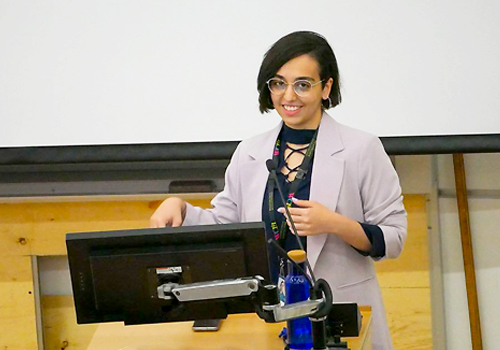When she first arrived at U of T, Aghia Mokhber says she was “a bit shy.” She was still adjusting to life in Canada, having arrived from Iran with her twin brother when she was 17 years old in 2018.
But those first days are long behind her. Mokhber is graduating with an honours bachelor of science in the health and disease specialist program as a member of New College, and just received word that she has been accepted to medical school at Queen’s University next fall.
“I was the first person in my family to go to university in Canada,” she says. “I didn't know anyone, so that wasn’t easy.”
Thinking she could use a little support, she reluctantly signed up for a mentorship program. “As a mentee in my first year, I was hesitant,” she says. “I thought, ‘I don't know, I'm shy and I don't want to talk to anyone.’”
But she was encouraged by a friend in the same program to get involved. “So I applied the day before the deadline, and I got matched with an amazing third-year student who ended up going into medicine as well.
“I had such a positive experience. He helped me with a lot of opportunities and reminded me of deadlines for applying for research opportunities. And I thought, ‘I want to do the same thing for other students.’ I found I really enjoyed talking to other people and giving them advice.”
That’s an understatement.

Mokhber participated in half a dozen different mentorship programs, such as the Medical Science Students United mentorship program, the Human Biology Students Union mentoring program, the Student Experience Mentorship program, and others, helping fellow students find the resources and support they needed to succeed.
In each program, Mokhber found she received as much as she gave. “I like helping other people. I mean, I want to be a doctor. But honestly, it was a mutual relationship. I got as much out of being a mentor as I did as a mentee.”
Mentoring often led to networking, and networking then turned into working and research opportunities — something that’s as important to Mokhber as mentoring.
She is currently working as a research assistant at Women’s College Hospital, assisting with research in hereditary breast cancer and ovarian cancer. She also worked as a research assistant in an obstetrical anesthesia unit in Sunnybrook Hospital for six months in 2021 — opening her eyes to the need for female-focused medical research.
“Being able to close existing gaps in knowledge is what is most important,” she says. “I was working on a project regarding labour pain and what was surprising and upsetting about it was that as common as labour pain is, it’s still pretty understudied and misunderstood.
“From that experience, I got more convinced to study women specifically as we know far less about them due to their historical exclusion from so many things. From that moment on I wanted to contribute to closing this gap in knowledge, literature and hopefully in care in the future.”
Back on campus, Mokhber has also closed a knowledge gap by making research more accessible and available.
In April, she helped co-organize and co-host a research forum that focused solely on undergraduate research. Securing funding from U of T Student Life’s Student Initiative Fund (SIF), the event attracted over 100 students.
“We had upper-year undergrads presenting their research projects to first- and second-year students,” says Mokhber. “That was an experience I was really proud of.”
She is equally proud of her podcast, A Moment of Science, Please! which she co-created and co-hosted.
“The main idea behind this podcast was to make research more understandable, and to let researchers explain their research in simple language,” says Mokhber.
Mokhber and her friend, Hawwa Chakera, who is also graduating as a member of University College majoring in human biology and immunology, created the podcast in the spring of 2021, with the first episode launching June 3 that year. The duo has since produced 16 episodes so far.
“Eventually we expanded a little so that we didn't only talk about their papers,” she says. “We're also talking about their career journeys, how they got there, what research opportunities they have for students or what kind of tips and advice they have to offer.”
As she receives her degree and prepares for medical school, Mokhber would love to see the podcast continue “and maybe try to rebrand and come up with new format and concepts,” she says.
“I will do my best to stay involved at any capacity. I think going to a new institution will allow me to network outside of Toronto and maybe even make the podcast team bigger and more diverse than what it is currently.”
In the meantime, she has this piece of advice to students just beginning their U of T experience: “Don't be shy, participate in as many programs as you can. You’re free to ask for help. I did and I never thought that I would be in this position or would have done all these amazing different things.”

